Orphan Black Series Finale, “To Right the Wrongs of Many” Review

Okay, Clone Club, group hug. It’s an emotional time.
In the series finale of Orphan Black, “To Right the Wrongs of Many,” we were gifted something extraordinary. It was simultaneously so very Orphan Black and yet so different in tone. Mainly because it was kind of happy. But I’ll get to that.
Part One: Before the Fall
I know I wasn’t the only one who started tearing up right off the bat because our opening scene is a flashback of Sarah and Mrs. S sitting in a car outside Planned Parenthood Toronto. They’re discussing what Sarah is about to do, which is get an abortion. (We know from the season 3 premiere that Sarah actually has had at least one abortion, but in this scene she’s clearly pregnant with Kira).
Sarah is conflicted, turning the informational pamphlet over in her hands, but she’s also defensive and combative, getting angry at everything S tries to say to her. It’s a stark contrast to the Sarah who, over the past five seasons, we’ve seen grapple in a very real way with her less-than-healthy coping mechanisms of running away, shutting people out, and self-sabotage on many levels. Sarah tries to get S to tell her what to do, probably so she can do the opposite, but S is S. She doesn’t play that game and she loves Sarah, even when Sarah can’t see it.
“The only person who can decide is you,” she says. And thus we have one of many satisfying moments that works on so many levels. We momentarily get S back, she is still our matriarch, and her words are words women have been using to fight for bodily autonomy in the face of patriarchal legislation that seeks to remove their bodily agency. Orphan Black being unapologetically feminist, yet again.
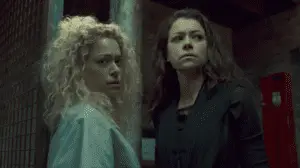
Flash forward to Sarah helping a struggling Helena down a DYAD hallway to the soundtrack of the alarm Our Guys tripped last week. It’s eerie and perfect. The twins narrowly escape Enger but find themselves trapped in a boiler room with no other way out, and Helena’s babies are coming VERY soon.
Meanwhile, apparently a serious head-bashing had no effect on Coady, and she’s still alive with just a little blood on her face? John (who has none of his PT Westmoreland facade left) is desperate and panicked. He needs that mutation from Helena’s cord blood but he’s running out of time. Even if/when they find the sestras and get the blood, they need to isolate it, which they can’t very well do in a decommissioned lab in which the plastic tent of a medical area they had set up is now in shambles. But Coady is all in now despite everything they worked for falling away around them. Honestly? I hope this is what is happening with patriarchal structures in general in the real world but I digress. Coady heads off to find Helena.
Art goes into Vigilante Justice mode and knocks out Enger, stealing her radio so he can monitor Coady et. al. He eventually finds Sarah, who has snuck back out of the boiler room to find medical supplies and water for her sister, who will not make it out of there without giving birth first. She sends him to Helena while she gets more supplies, but guess who’s found her first?
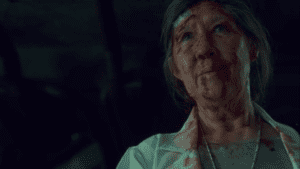
Coady learned first hand how ruthless Helena is and how capable of killing people with her bare hands and stuff, so she threatens to shoot Art if he doesn’t deliver the babies for her, since she knows Helena won’t hurt Art. Then Art and Helena have this moment, it’s so subtle and fleeting but potent at the same time. Art sees the screwdriver Helena is secretly clutching (shoved into her hand by Sarah before she went to get supplies) and they lock eyes. They’re silent, but they understand each other, and it underscores just how tight of a family these characters have become.
Helena plays up the moaning, Art pretends to freak out over a lot of blood, and when Coady, panicking, comes closer to see, Art grabs her, pulls her over his shoulder, we hear the scree scraw! for the last time, and Helena shoves the screwdriver right through her throat. Good luck coming back from that one, Virginia.
Meanwhile, John is rapidly dying. He gets his doctor to give him a methamphetamine injection and is ready to leave for the island, but his speech is slurred and his sentences are making less and less sense. Sarah goes back to the plastic med bubble to get supplies, and while she’s inside, she hears the Old Man’s voice. John is on the other side of the cloudy plastic sheeting, taunting her, circling her. She can’t quite make him out.
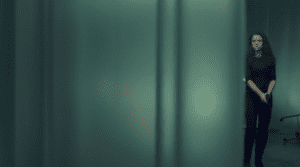
“How fitting you return to your cage,” he says. “All lab rats do.”
“You never caged us,” Sarah responds. “Not me and Helena.” She shoots at the plastic multiple times, and hears him fall. After a beat of silence, he comes bursting through the plastic, tearing it down and holding it over her face to suffocate her. They struggle, but our OG Badass clone kicks that Old Man right up off of her and stands over him, lying bloody on the floor. Still, he continues to taunt, gaslight, and insult her. He drones on and on about how he created her, and she is nothing even as he lays gasping and dying before her. Sarah, like all of us, is sick of hearing this bullshit. “We survived you, me and my sisters,” she says. “This is evolution.” Then she grabs an oxygen tank and smashes his head in.
A note about violence. I am not here for violence. I will admit I find it satisfying to see these particular villains go down due to their status as stand-ins for the patriarchy, and the violence fits with the show. But I don’t like this particular element.
Sarah books it back to the basement, and we are treated to one of the most moving scenes I’ve seen on television. With Art at her back and Sarah encouraging her, Helena gives birth to two baby boys on a sheet of cardboard in the dead shell of DYAD. This sequence is layered in with a flashback sequence of Sarah giving birth to Kira with S by her side. Sarah is clearly channeling S with Helena. Nurture, support, she is all in, just like S was, even though Sarah would forget this periodically.
I’ve said it before but I’ll say it again: they way Orphan Black has utilized flashbacks has worked so well for me. They give so much depth and context and really hammer home the themes of connection and family.
Part Two: What Do You Want to Do With Our Freedom?
Cosima asked this of Delphine in 5×08, and despite being unsure of whether we would get to see the answer given the intensity of the plot throughout the season, It Has Been Delivered.
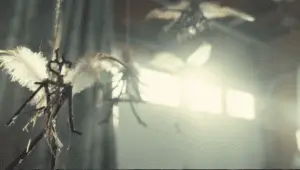
We jump in time once more, to three months after the death of the seemingly unstoppable patriarchal force of Neolution. Helena is living in the Hendrix’s garage, where her babies, temporarily named Purple and Orange, nap in hammocks and she continues to write her memoirs. Donnie and Alison have kind of come back to each other after everything they’ve been through. Alison is still sporting her new hairstyle and keyboard-playing ambitions and Donnie is a regional manager for a concrete floor company; they seem content within their family of their own kids (who have finally appeared again), Helena, and the new twins.
As an aside, I’ve read criticism of Alison’s late-series “transformation” but I think it works well in the story. People go through chapters of their lives in which they change at a more rapid rate than other times. In Alison’s case, she had a concentrated period of self-reflection and some of the outward changes she made may seem incongruous on the surface. But to me, it just feels like she’s grown. Her Alison-essence is still there in her voice, mannerisms, and general personality, and that’s a testament to Tatiana Maslany.
Anyway, Sarah and Kira are living in S’s house and Sarah is about to take her GED. Cosima and Scott have been tutoring her (have I mentioned how much I love Cosima-Sarah team-ups?). On this last day we spend with the sestras, Alison and Donnie are throwing a post-birth baby shower for Helena, and Sarah is going to take her test. She sends Kira to school, and Kira says, “Don’t worry about the test, mum, just do your best,” before skipping off alone in her v.cute straw hat. (Is this really Orphan Black?)
Felix comes home from New York, where he’s had an art opening (get it Fe!) and isn’t happy to see a For Sale sign on their front lawn. Sarah puts up defenses again, saying they talked about it, though it’s clear whatever they talked about was hypothetical. Later, when Sarah goes to take her test, she flakes out and leaves without doing it.
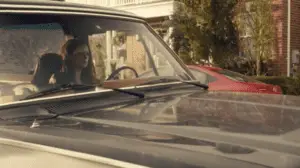
Cosima, Delphine, Scott and Hellwizard (I’m sorry but is there a better team of characters? no) have successfully inoculated 6 Ledas (including Tony, glad to know he’s alive), but Cosima is feeling discouraged that the process of finding them is so slow. Delphine comforts her by telling her to focus on what they have done; I love you Delphine.
Our core sestras show up to Alison’s place along with Our Guys Scott, Hellwizard, Art (with daughter Maya and presumably-adopted daughter Charlotte), and of course brother-sestra Felix as well as Colin (yass). The party is pretty much exactly what Helena dreamed of when she was trapped in a box in the desert in season 3, so I would say we’re all getting what we deserve with this scene.
Except we get more than expected! Because hi Cophine walking into a baby shower with arms around each other and Cosima being not really great with babies but very great with her girlfriend! I have never felt more represented.
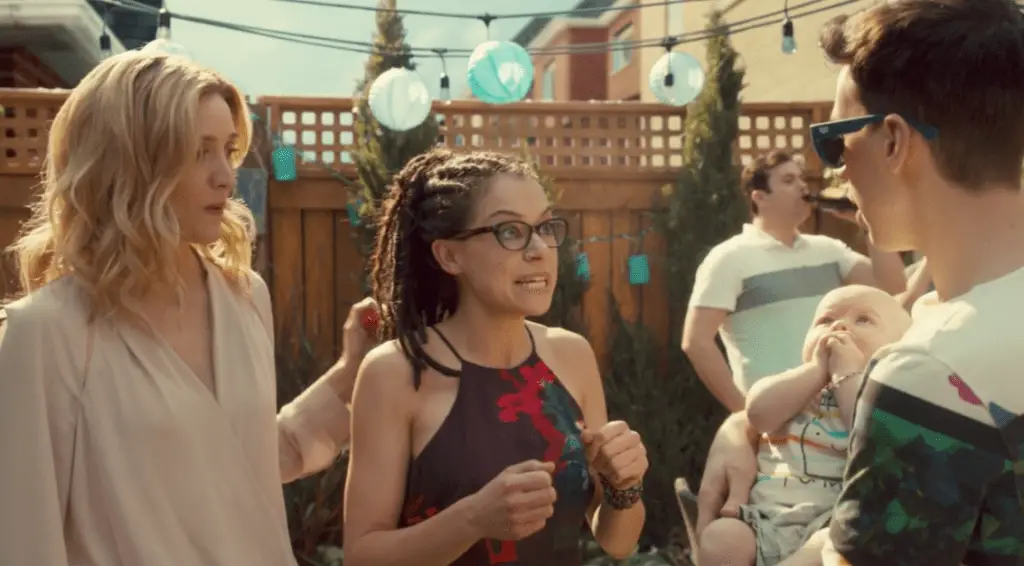
When Sarah arrives, we’re also treated to a small but wonderful scene between her and Delphine in which Delphine struggles to find words of condolence. She also tries to apologize for not realizing that the deal with Ferdinand would go down like it did; she feels complicit, guilty, and sad. Sarah has come all the way around to Delphine and doesn’t blame her, but she is still in a world of pain, and is carrying her own guilt for not knowing how to be happy now that no one is left for her to fight. Everyone asks how Sarah’s test went and she blows up, admitting she didn’t go. Helena tells Art that she’s worried about Sarah, “She is not mended.”
Later that night, the sestras gather around Sarah by the fire pit in the yard. It’s our last multi-clone scene. Sarah confesses to being afraid that she will always be a terrible mother and a broken person. Alison chimes in with a parenting-mistake story of her own; Cosima opens up about worrying that not feeling maternal makes her selfish; Helena shares that she lets her babies eat sand. (“Where does this sand come from? I don’t know, I just let them eat it”).
It’s a moment that could be shared by any iteration of family, and that’s the crux of it. These women are true sisters, the constellation of characters in this show are true family, and freedom from being hunted by Neolution looks like this. Real, messy life. Not perfection, not pure happiness, but everyday fuck-ups, mundane details, feelings of fear and sadness, and the ability to sit around with the people you love in the backyard.

But there’s one more clone we need to see for the last time: Rachel, waiting in an Uber outside Alison and Donnie’s house at the request of Felix. Felix gets in the car to talk to her, and she hands him some papers he asked for. Her bionic eye has been replaced by a glass eye, and she’s in hiding. She’s lost her whole identity, as she says, and while Felix is sympathetic, he can’t let her come in. She understands and accepts this; Felix wishes her a good life and heads back to the group of sestras. He hands the papers to Cosima—files of every Leda, 274 to be exact, so now she and Delphine can live their best lives and travel the world while also saving Ledas from the clone disease.
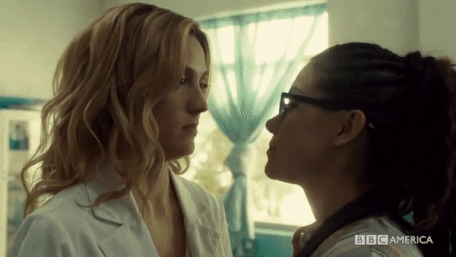
Helena brings out her journal and starts to read from her memoir. It’s about her sestras, and it’s called Orphan Black. Teasing ensues about how much sense this title doesn’t make; it’s a cute easter egg to the fandom, contingents of which have said this for years.
In the end, Cophine are off traveling the world inoculating Ledas, the hybrid-Hendrix family is living peacefully (which includes Donnie stripteasing to Alison’s keyboard’s built-in beats), and Helena has named her twins Arthur and Donnie. Sarah, Felix, and Kira are still in S’s house, the place where it all started, the locus of the family and the story, so naturally, the place where it ends. We see the three headed out to Shite Beach and the door close, and the episode ends with one last shot of S’s sun-drenched living room, fruit and tea on the kitchen table, Felix’s paintings on the walls, the curtains partially drawn.
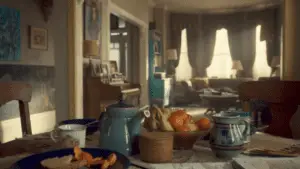
Final Thoughts
Phew. What a ride. I’ll be back at the end of the month with a season retrospective, but for now let me say this: the narrative journey we’ve been on with this show that was so solidly framed around complex women and their complex female relationships, in which the ultimate enemy was literally the patriarchy, has deeply resonated with me.
I do see the flaws re some gender stuff, though. While I like the general idea creators John Fawcett and Graeme Manson touted about Helena’s twins being boys who were going to be raised feminist by the most badass group of women, it’s important to acknowledge that gender is a social construct and the concept of a binary one is dying. The flubbing of the Tony character remains one of the major flaws of the story. But I still give major kudos to everyone who worked on this show for tackling themes of female power, identity, oppressive structures, autonomy, and found family in such a creative, beautiful, gripping way.
I didn’t know what to expect in the finale of a show that has done its fair share of dabbling in grimdark. I wouldn’t have been surprised to see more major characters die, actually, but I’m so happy they went a more sincere and earnest route. It’s unusual to see our characters at peace, and it was lovely to behold. I really liked the decision to have the action part finished by halfway through the episode and to follow our sestras a little further down the line.
Orphan Black is unique in pop culture in many ways: the female-centered story, the mind-blowing acting, the suspense of an action movie paired with the deep emotion of a character drama, and a good dose of humor spread throughout. Plus, I’m pretty sure it was one of, if not the very first TV show in which two women fell in love with each other in season 1 and were both alive and together in the end. I know I’m far from the only one who will miss the delight of having new episodes, but I’m thankful for its existence in the world and in my life.
Much love, Clone Club.

